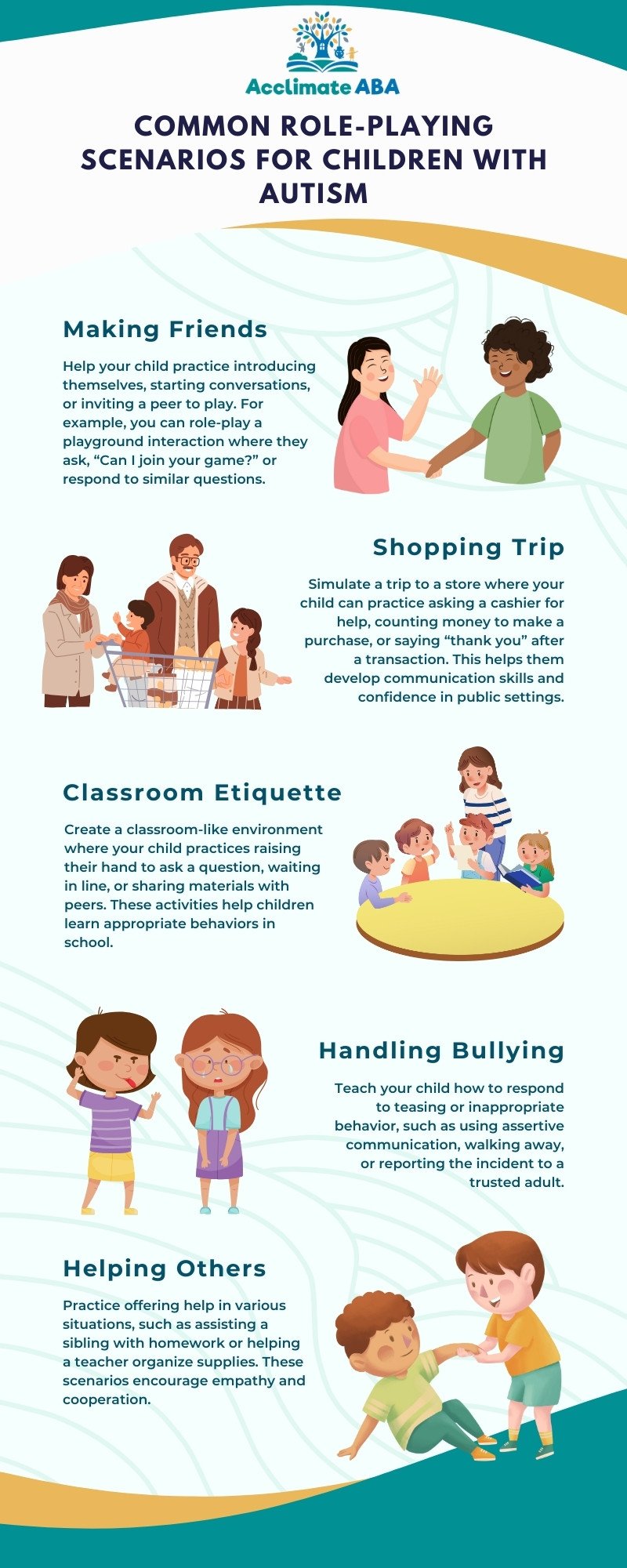Role-Playing to Improve Social Skills for Children with Autism

Key Points:
- Role-playing can help children with autism practice social interactions in a safe, structured environment.
- It builds confidence by simulating real-world situations, such as conversations or sharing.
- Parents and therapists can use role-playing to target specific social skills like turn-taking, greetings, or problem-solving.
Many children with autism face challenges in social interactions, such as understanding body language, initiating conversations, or navigating group settings. Role-playing provides a powerful and engaging way to address these difficulties, helping children practice and strengthen their social skills through hands-on, real-world simulations.
What is Role-Playing in Autism Therapy?
Role-playing is a technique where children act out specific scenarios to practice and learn appropriate social behaviors. This hands-on approach allows children to simulate real-life situations in a structured and supportive setting.
For example, a role-play scenario might involve greeting a classmate, ordering food at a restaurant, or resolving a conflict. By rehearsing these situations, children can gain confidence, improve communication, and learn how to respond appropriately in similar real-world interactions.

Why is Role-Playing Effective for Social Skills Development?
Role-playing is particularly effective in developing social skills for children with autism because it combines practice, feedback, and repetition—three crucial components for learning. This method allows children to practice various social interactions in a controlled and structured environment.
-
Safe Environment to Make Mistakes
Role-playing creates a safe, judgment-free space where children can try new behaviors without fear of failure. Mistakes become valuable learning moments, helping children understand what works and what doesn’t.
-
Immediate Feedback
Therapists or parents can provide guidance in real time, pointing out successes and areas for improvement. This ensures that children understand social nuances and adjust their behaviors accordingly.
-
Repetition and Consistency
Repeating scenarios helps children internalize behaviors over time, turning learned skills into natural responses.
-
Preparation for Real-Life Challenges
Simulating everyday situations, such as starting a conversation or resolving a conflict, builds confidence and equips children with skills to face social challenges outside therapy.
What Social Skills Can Be Taught Through Role-Playing?
Role-playing is versatile and can target a wide range of social skills, depending on a child’s individual needs. Below are some examples:
1. Basic Communication Skills
- Initiating a conversation (e.g., saying “Hi” or asking a question).
- Responding to greetings or questions appropriately.
- Practicing active listening, such as making eye contact and nodding.
2. Turn-Taking and Sharing
- Waiting for a turn in a group activity or game.
- Sharing toys, supplies, or other resources.
3. Understanding Emotions
- Recognizing and labeling emotions in themselves and others.
- Practicing empathy by role-playing situations where someone feels sad or frustrated.
4. Conflict Resolution
- Handling disagreements calmly (e.g., using words instead of yelling or hitting).
- Negotiating solutions that work for everyone involved.
5. Nonverbal Communication
- Practicing appropriate facial expressions and gestures.
- Recognizing body language and understanding social cues.
Role-playing can be tailored to address specific social situations your child may encounter in daily life. By practicing these scenarios, children can develop confidence and learn how to respond appropriately. Here are some effective role-playing scenarios to try:

How to Implement Role-Playing for Children with Autism
Role-playing is an invaluable tool for helping children with autism practice social skills in a structured and engaging way. Parents, caregivers, and ABA therapists can use this method to create scenarios that mirror real-world interactions, enabling children to build confidence and learn appropriate responses. Here’s how to get started:
1. Identify Key Skills to Practice
Begin by identifying the social skills your child struggles with, such as taking turns, initiating conversations, or handling conflicts. Focus on scenarios relevant to their daily life, like asking a peer to play or speaking with a teacher.
2. Create Structured Scenarios
Design scenarios that mimic everyday interactions. For instance, pretend to be a cashier while your child practices purchasing an item. Use props or visual aids, such as pictures of facial expressions or conversational cues, to make the activity relatable.
3. Model Desired Behaviors
Demonstrate the correct behavior to provide a clear example for your child. Break the skill into smaller steps, like smiling, making eye contact, and speaking clearly during a greeting.
4. Practice and Repeat
Allow your child to play different roles to understand various perspectives. Repeating scenarios regularly reinforces learning and increases comfort in applying skills.
5. Provide Positive Reinforcement
Celebrate progress, whether through praise, tangible rewards, or tokens. Highlighting their efforts and improvements encourages continued participation and growth.
How Acclimate ABA Can Support Your Child’s Journey
Role-playing is an invaluable tool for helping children with autism improve their social skills. By providing a safe, structured environment to practice real-world scenarios, role-playing builds confidence, strengthens communication, and prepares children for meaningful interactions.
At Acclimate ABA, we specialize in creating personalized ABA therapy plans that include evidence-based techniques like role-playing. Our experienced therapists are dedicated to helping your child achieve their social and developmental goals.
We proudly serve families in Utah and surrounding areas. Contact us today to learn how ABA therapy can transform your child’s life through targeted social skills training.
